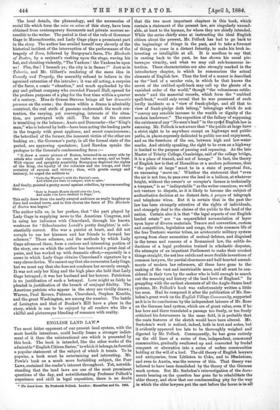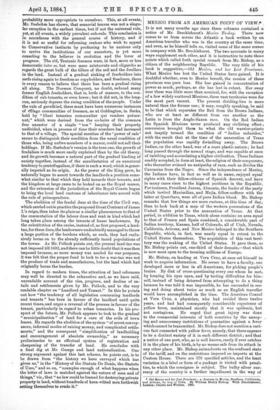ENGLISH LAND LAW.* THE most bitter opponent of our present
land system, with the most hostile intentions, could hardly frame a stronger indict- ment of it than the unintentional one which is presented by this book. The book is intended, like the other works of the admirable "English Citizen Series," to which it belongs,to furnish a popular statement of the subject of which it treats. To be popular, a book must be entertaining and interesting. Mr. Fowle's book on a much more forbidding subject, the Poor Laws, sustained the reader's interest throughout. Yet, notwith- standing that the land laws are one of the most prominent questions of the day, and notwithstanding Professor Pollock's experience and skill in legal exposition, there is no doubt
• The Land Laws. By Frederick Pollock. London: Macmillan and Go. 1883. that the two most important chapters in " this book, which- contain a statement of the present law, are singularly unread- able, at least to the layman, for whom they are chiefly intended.. While the series chiefly aims at instructing the ideal English citizen about the present, Mr. Pollock has had to go back to the beginnings of things in the past, and to take a forecast of things to come in a distant futurity, to make his book in- teresting or intelligible at all. It is needless to say that in casting back to the past, he has shown his usual pic- turesque vivacity, and what we may call sub-humorous in- tention. These characteristics are also strongly marked in the introductory chapter, in which he summarises the actual; elements of English law. Thus the lord of a manor is described. as the "lord of a secular ruin, in which he that knows the secret of the crabbed spell-book may call up the ghosts of a. vanished order of the world," though "the voluminous settle- ments" and the manorial records, which form the "crabbed spell-book," would only reveal that he was possessed of such lordly incidents as a "view of frank-pledge, and all that to. view of frank-pledge cloth belong," belongings which do not "convey any sensible increase to the wealth or dignity of the modern landowner." The exposition of the fallacy of supposing the existence of any "No man's land" in the eyelof English law is. amusing. Mr. Pollock is not aware that "the public at large have- s strict right to be anywhere except on highways and public. paths, in places expressly dedicated to public use and enjoyment,. and on the foreshore of the sea, between high and low-water. marks. And strictly speaking, the right to be even on a highway is limited to the purpose of passing and repassing. As the late Master of Trinity College, Cambridge, said of the college bridge,. it is a place of transit, and not of lounge." In fact, the theory of English law is that of Heraclitus or a modern policeman, that "the public at large" must be in a state of perpetual flux, an unceasing move on.' Whether the statement that "even the air is not free, to pass over the land in a balloon, at whatever- height, without the owner's or occupier's licence is technically a trespass," is as "indisputable "as the writer conceives, we will not venture to dispute, as it is likely to become the subject of authoritative decision at no distant date, a propos of telegraph and telephone wires. But it is certain that in the past the. law has been strangely attentive of the rights of individuals,. and strangely deaf to the claims of the public to the land of the nation. Certain also it is that "the legal aspects of our English: landed estate" are "an unparalleled accumulation of layer- upon layer of diverse materials. Tenure and convention, custom- and competition, legislation and usage, the rude common life of the free Teutonic warrior tribes, an aristocratic military system sprung from sheer necessities of mutual defence, and disguised in the terms and reasons of a Romanised law, the subtle de- ductions of a legal profession trained in scholastic disputes,. the attempts of an impatient Parliament to make their crooked things straight, the not less subtle and more flexible inventions of common lawyers, the partial clearances and half-hearted amend- ments of modern law reformers, all these have gone to the- making of the vast and inextricable mass, and all must be con- sidered in their turn by the seeker who is bold enough to search out the meaning and history of the land laws of England." In- grappling with the earliest elements of all the Anglo-Saxon laud systems, Mr. Pollock's book was unfortunately written a little. too soon. Had he composed it after the publication of Mr. See- bohm's great work on the English. Village Community, supported as it is in its conclusions by the independent labours of Mr. Ross, on the German land system, which are of great value, even if he- has here and there translated a passage too freely, or too freely criticised his forerunners in the same field, it is probable that the main features of the sketch would have been altered. Mr. Seebohm's work is noticed, indeed, both in text and notes, but it evidently appeared too late to be thoroughly weighed and digested by Mr. Pollock. Consequently, he has gone entirely on the old lines of a series of free, independent, communal communities, gradually swallowed up and converted by feudal conquest or absorption into a series of unfree communities holding at the will of a lord. The old theory of English lawyers and antiquaries, from Littleton to Coke, and to Blackstone; and even to Austin, was the reverse of this. That theory was believed to have been demolished by the theory of the German mark system. But Mr. Seebohm's reinvestigation of the docu- ments bearing on the question has gone far to rehabilitate the older theory, and show that our condescending pity for the way in which the older lawyers put the cart before the horsaiain all
probability more appropriate to ourselves. This, at all events, Mr. Seebohm has shown, that manorial tenure was not a singu- lar exception in the earliest times, but if not the universal rule, yet, at all events, a widely prevalent sub-rule. This conclusion is in accordance with the general coarse of history, and if it is not so useful for reforming orators who wish to appeal to Conservative instincts by professing to be anxious only to revive the institutions of our ancestors, is yet more consoling to the believer in evolution and the lover of progress. The old, Teutonic freemen were, iii fact, more or less democratic inter se, but were mere aristocrats and oligarchs as regards the great bulk of the tillers of the soil and the dwellers in the land. Instead of a gradual sinking of freeholders into serfs rising again to freedom as copyholders, and freedmen, there is every reason to believe that there has been a gradual rising all along. The Norman Conquest, no doubt, reduced many former English freeholders, that is, lords of manors, to the con- dition of sub-tenants, or even lower; but it did not, in the long- run, seriously depress the rising condition of the people. Under the rule of gavelkind, there must have been numerous instances of Village communities of freemen, as at Goldington, in Berke, held by " liberi tenantes communiter qui vendere potuer- nut," which were derived from the co-heirs of the common free ancestor of a single " ton " keeping their property undivided, when in process of time their numbers had increased to that of a village. The special mention of the power of sale' seems to distinguish their condition from the usual condition of those who, being unfree members of a manor, could not sell their holdings. If Mr. Seebohm's version is the true one, the growth of feudalism is much more easily explained than by the old theory, and its growth becomes a natural part of the gradual binding of society together, instead of the manifestation of an unnatural tendency tos.entrifugalism, if there is such a word, which is gener- ally imputeA as its origin. As the power of the King grew, he naturally began to assert towards the landlords a position some- what similar to that which they held towards their tenants, and the kingdom at large came to be looked on as the Royal manor, and the extension of the jurisdiction of the Royal Courts began to bring the local land customs of inheritance into accord with the rule of primogeniture.
The abolition of the feudal dues at the time of the Civil war, which carried out in practice the proposed Great Contract of James L's reign, then takes its place as a similar phenomenon to that of the commutation of the labour dues and rent in kind which had long taken place among the tenants of lesser landowners. By the substitution of the excise, instead of, as first proposed, a land- tax, for these dues, the landowners undoubtedly managed to throw a large portion of the burdens which, as such, they had exclu- sively borne on to the already sufficiently taxed populations of the towns. As Mr. Pollock points out, the present land-tax was not imposed till 1692, and there can be little doubt that it was then imposed because, as more money was needed for war purposes, it was felt that the proper fund to look to for a war-tax was not the produce of trade and manufactures, but the land which had originally borne the burden.
In regard to modern times, the attention of land reformers may well be directed to the exhaustive and, as we have said, unreadable account of the rise, progress, and decline of en- tails and settlements given by Mr. Pollock, and to the very readable chapter on "Landlord and Tenant." In this he points out how "the tendency of all legislation concerning landlords and tenants" has been in favour of the landlord until quite recent times, and urges a reversal of the process in favour of the tenant, particularly in regard to urban tenancies. In his pro- spect of the future, Mr. Pollock appears to look to the gradual " municipalisation " of land for a cure of the evils of town leases. He regards the abolition of the system "of secret convey- ances, informal modes of raising money, and complicated settle- ments," and the consequent "simplification of landholding and encouragement of absolute ownership," as necessary preliminaries to an effectual system of registration and cheapening of the transfer of land. He concludes with a final dig at Mr. George and land nationalisation. One strong argument against this last scheme, he points out, is to be drawn from "the history we have surveyed which has given us," in the "History of the Statute De Donis, the Statute of Uses," and so on, "examples enough of what happens when the letter of laws is matched against the nature of man and of things," viz., that "no law could be framed for destroying private property in land, without hundreds of keen-witted men forthwith setting themselves to evade it."















































 Previous page
Previous page